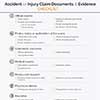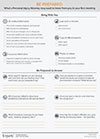What laws impact boat accidents in the Old Dominion State?
From the sparkling waters of the Chesapeake Bay to the rushing waters of the Potomac River, Virginia is home to some of the most desirable bodies of water for boating enthusiasts.
Just like highways, certain laws govern the waterways in Virginia — and there are consequences if you get into an accident.
In this article, we’ll take a look at some common causes of boat accidents, important laws governing boating, and when you can receive compensation after a boat accident.
Common causes of boat accidents
According to the United States Coast Guard, the 5 most common types of boating accidents in the US are:
- Collisions with other vessels
- Collisions with fixed objects
- Flooding
- Grounding
- Falls overboard
| Primary contributing factors of boating accidents in the U.S. (2018) | ||||
|---|---|---|---|---|
| Category | Contributing factor | Accidents | Deaths | Injuries |
| Operation | Alcohol use
Drug use Excessive speed Failure to vent Improper lookout Inadequate onboard navigation lights Navigation rules violation Operator inattention Operator inexperience Restricted vision Sharp turn Starting in gear |
254
5 276 30 440 11 184 654 387 62 57 2 |
101
6 25 2 27 0 19 50 40 2 7 1 |
204
3 231 24 316 9 144 437 213 34 41 1 |
| Loading of passengers or gear |
Improper anchoring
Improper loading Overloading People on gunwale |
28
51 36 35 |
2
19 23 12 |
8
30 11 23 |
| Failure of boat | Equipment failure
Hull failure Machinery failure |
47
37 321 |
7
5 9 |
11
5 86 |
| Environment | Congested waters
Dam/lock Force of wave Hazardous waters Missing navigation aid Weather |
19
7 209 169 23 205 |
0
6 10 61 1 40 |
7
5 153 70 9 96 |
| Miscellaneous | Carbon monoxide exposure
Ignition of fuel Medical condition Other |
1
59 25 511 |
0
4 16 138 |
2
49 8 281 |
| All categories | 4145 | 633 | 25111 | |
|
Source: United States Coast Guard |
||||
In Virginia, there were 80 recreational boating accidents in 2018, and 11 people were killed.
Federal boating laws
Boating accidents can be particularly complicated because they may implicate both federal and state laws. Federal laws (also called “maritime” or “admiralty” laws) usually govern boating accidents that occur:
- On navigable waters (bodies of water that provide a channel for the transportation of goods and people), and
- Involve traditional maritime activities (commercial activities rather than recreational activities).
Examples of federal laws that may govern commercial boating accidents include:
- The Oil Pollution Act enforces the removal of oil spillage and implements processes for determining damages.
- The Death on the High Seas Act creates a wrongful death claim for families of deceased sailors if the sailor was killed by negligence on international waters.
- The Division of Longshore and Harbor Workers' Compensation Act provides compensation and vocational rehabilitation to injured workers, or compensation to the families of the deceased.
Virginia boating laws
While federal boating laws govern most commercial boating accidents, state laws govern most recreational boating accidents. These laws are extensive and cover everything from licensing to boating while under the influence.
Let’s look at some highlights:
Registration and titling
All boats used on the public waters of Virginia must be registered and titled. The Virginia Department of Game and Inland Fisheries (DGIF) administers all boat titling and registration. There is a fee for registering and titling your boat, but the potential fine for failing to do so is much higher.
Life jackets
In Virginia, there must be 1 USCG approved life jacket for each person on the boat. The life jacket must be the appropriate size for each intended wearer.
It’s not necessary that each person on the boat wear the life jacket at all times, but each life jacket must be “readily accessible.” This means that the life jacket must be in an open and obvious place, and must not be under lock and key or in a protective covering.
In addition to the life jackets, there must be at least 1 USCG approved throwable (ring buoy or seat cushion) on most vessels of 16 feet or greater.
Speed
It’s unlawful to operate a boat greater than “no wake” (defined as the slowest possible speed required to maintain steerage and headway):
- In areas marked with regulatory “no wake buoys”
- Within 50 feet or less of docks, piers, boathouses, boat ramps, and people in the water
In addition, boat operators must reduce their speed to avoid endangering persons or property by the effect of their boat’s wake.
Other than obeying no-wake and reduced-speed laws, there is no speed limit specific to personal watercraft in Virginia.
Navigation rules
Boat operators are responsible for knowing and following all the applicable navigational rules. It’s therefore wise to thoroughly review all the navigation rules, but here are some main points to keep in mind:
- Head-on. When 2 power-driven vessels meet head-on, each vessel must alter its course starboard (right).
- Crossing situations. In crossing situations, power-driven boats must give-way (i.e., take early and substantial action to keep clear of the other vessel) to sailing vessels regardless of the angle the power-driven vessel approaches the sailing vessel.When 2 sailing vessels are approaching each other in a crossing situation, they must give-way as follows:
- When each has the wind on a different side, the vessel which has the wind on the port side must keep out of the way of the other.
- When both have the wind on the same side, the vessel which is to windward (windward side is the side opposite to that on which the main-sail is carried) must keep out of the way of the vessel which is to leeward.
- If a vessel with the wind on the port side sees a vessel to the windward and can’t determine with certainty whether the other vessel has the wind on the port or on the starboard side, it must keep out of the way of the other.
- Overtaking. Any vessel overtaking any other must keep out of the way of the vessel being overtaken.
Boat accident reporting requirements in Virginia
You’re required by law to file a formal report of your boating accident with the DGIF if there is:
- Damage over $2,000 by or to the vessel or its equipment
- Injury (requiring medical help beyond First Aid) or loss of life
- Disappearance of any person from a vessel
Written reports must be filed within the following time frames from the boating accident:
- 48 hours (if a person dies within 24 hours of the accident)
- 48 hours (if a person involved is injured and can’t perform usual activities)
- 48 hours (if a person disappears from a vessel)
- 10 days (if property damage is more than $2,000)
Boating safety education requirements
Virginia requires all operators of personal watercraft (jet skis, wave runners, etc.) and motorboats with a 10 hp or greater motor to complete an approved boating safety education course and keep a completion card onboard when operating the vessel.
Determining liability in a boat accident
As is the case with car accidents, you usually have to prove that some other person or entity was negligent in a boating accident in order to recover damages for your injuries. This means, you have to prove that the other person or entity acted without reasonable care, and that action or failure to act was the cause of your injury.
Common examples of individuals and entities who may be held liable for boating accidents include:
- A boat operator
- A boat owner
- A manufacturer
- An employer
Recoverable damages in a boat accident
The bad news is that boat accidents can be devastating, with losses ranging from property damage to death.
The good news is that Virginia allows boat accident victims to recover both economic and noneconomic damages. Economic damages refer to the loss of monetary resources. Noneconomic damages are those damages that aren’t easily quantifiable.
Here’s a breakdown of what each type of damages includes:
| Damages available in a Virginia boat accident lawsuit | |
|---|---|
| Economic damages | Noneconomic damages |
| Property damage | Pain and suffering |
| Medical expenses | Emotional distress |
| Lost wages | Loss of consortium |

Damages worksheet to track expenses for your injury claim (medical treatment, property damage, lost wages, prescriptions)
Download in PDF format

Sample accident journal/diary to help you document the effect on your daily life
Download in PDF format
Preparing for your meeting with a boat accident attorney
The vast majority of attorneys offer free initial consultations. Whether you end up hiring the attorney for your boat accident case or not, it’s in your best interest to make the most out of this consultation.
How can you get the most of your initial consultation?
Here are some tips:
Bring all the relevant documents to your boat accident case (photos of property damage, medical records, etc.). Not sure what documents are relevant? Take a look at our checklist:

Checklist of 30 items to help you prepare for making a personal injury or accident claim
Download in PDF format
Be prepared to answer any questions your attorney may have about the accident. Not sure what questions the attorney will ask? Here are some questions you should be prepared to answer:

A worksheet to prepare for your first meeting with a personal injury attorney – what to bring, what they'll ask
Download in PDF format
Finally, keep in mind that an initial consultation is used, in part, to determine whether you want to hire the attorney you’re meeting with. In the case of a boat accident, you’ll want to hire an attorney who has experience litigating boat accidents. Here are some questions to ask your attorney to make sure they’re a good fit for your case:

Worksheet with questions to ask a personal injury attorney to help determine if he or she will be a good fit for your case
Download in PDF format
Having trouble locating an attorney to handle your boat accident case? Use our free online directory to locate an experienced attorney in your area.
See our guide Choosing a personal injury attorney.


